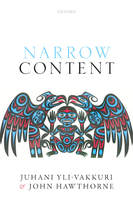Juhani Yli-Vakkuri is Senior Research Fellow at the Dianoia Institute of Philosophy at Australian Catholic University. He holds a doctorate in philosophy from the University of Oxford and has previously been Professor of Philosophy of Language at the University of Tartu, Alexander von Humboldt Research Fellow at Bielefeld University, and Postdoctoral Research Fellow at the Centre for the Study of Mind in Nature, a Norwegian Centre of Excellence at the the University of Oslo. He has held visiting positions at the University of Barcelona, the Humboldt University of Berlin, the University of Salzburg, the University of Oslo, and the University of Oxford (as Associate Faculty Member). Yli-Vakkuri's current research is on the foundations of logic and semantics, and on automated reasoning. He is co-editor (with Mark McCullagh) of Williamson on Modality (Routledge, 2017), co-author (with John Hawthorne) of Narrow Content (Oxford University Press, 2018), and co-author (with John Hawthorne and Cian Dorr) of The Bounds of Possibility: Puzzles of Modal Variation (Oxford University Press, 2021).
Books

The Bounds of Possibility by Cian Dorr, John Hawthorne, and Juhani Yli-Vakkuri. Oxford University Press, 2021
“[The Bounds of Possibility] is a formidable achievement, exemplifying contemporary metaphysics at its best.”
“A depressing feature of most philosophical discussions of properties and relations, the problem of universals, and the like is that no [...] comprehension principle is on the horizon. Not even the possibility of one is discussed. Yet standard higher-order logics have explicit, unrestricted comprehension theorems for all types of predicate. [The Bounds of Possibility] rightly emphasizes the contrast to motivate the higher-order framework.”
“An extreme but tempting comparison is with the rigorization of analysis in 19th-century mathematics, after the old methods started yielding apparent counterexamples to apparently proved theorems. Contemporary philosophers who persist in theorizing about properties and relations in the old-fashioned discursive way, without clear comprehension principles, remind me of 19th-century mathematicians who persisted with the old-fashioned methods of argument when those developed by Cauchy and Weierstrass were already available, as if what was good enough for 1800 was good enough for 1900.”
“The field is developing with almost frightening rapidity. One suspects that in a very few years, all three authors will have considerably advanced their ideas, perhaps not all in the same direction. Meanwhile, there is an exciting sense of new intellectual landscapes coming into view, quite unlike the tired rounding-up of the usual suspects one so often has to endure in philosophy.”
“[The Bounds of Possibility] provides the means to build on its achievements, perhaps to supersede them. That is what one expects of good science. ”
Timothy Williamson, University of Oxford
Buy this book in: US | UK | Australia | Canada | Germany | France | Italy | Spain
“[The Bounds of Possibility] is a formidable achievement, exemplifying contemporary metaphysics at its best.”
“A depressing feature of most philosophical discussions of properties and relations, the problem of universals, and the like is that no [...] comprehension principle is on the horizon. Not even the possibility of one is discussed. Yet standard higher-order logics have explicit, unrestricted comprehension theorems for all types of predicate. [The Bounds of Possibility] rightly emphasizes the contrast to motivate the higher-order framework.”
“An extreme but tempting comparison is with the rigorization of analysis in 19th-century mathematics, after the old methods started yielding apparent counterexamples to apparently proved theorems. Contemporary philosophers who persist in theorizing about properties and relations in the old-fashioned discursive way, without clear comprehension principles, remind me of 19th-century mathematicians who persisted with the old-fashioned methods of argument when those developed by Cauchy and Weierstrass were already available, as if what was good enough for 1800 was good enough for 1900.”
“The field is developing with almost frightening rapidity. One suspects that in a very few years, all three authors will have considerably advanced their ideas, perhaps not all in the same direction. Meanwhile, there is an exciting sense of new intellectual landscapes coming into view, quite unlike the tired rounding-up of the usual suspects one so often has to endure in philosophy.”
“[The Bounds of Possibility] provides the means to build on its achievements, perhaps to supersede them. That is what one expects of good science. ”
Timothy Williamson, University of Oxford
- Review by Timothy Williamson in Analysis
Buy this book in: US | UK | Australia | Canada | Germany | France | Italy | Spain

Narrow Content by Juhani Yli-Vakkuri and John Hawthorne. Oxford University Press, 2018
“This is a book for students and scholars of philosophy of mind and philosophical psychology... Recommended.”
Choice
“This important book ... is presented as a third act in what might be called the Twin Earth Wars ... In [it], the next-generation externalists Juhani Yli-Vakkuri and John Hawthorne aim to strike down internalists on behalf of the empire for once and for all, deploying the awesome weapon Mirror Man to give an argument that narrow content is impossible.”
“Yli-Vakkuri and Hawthorne lay out a definition of narrow content with more formal precision than anyone else has done.”
“Philosophers on both sides of the issue can be grateful to Yli-Vakkuri and Hawthorne for invigorating a debate that had been threatening to go stale, and for setting an agenda for further work.”
David Chalmers, New York University
“Narrow Content is a tremendously good book.”
Alex Byrne, MIT
“[Yli-Vakkuri and Hawthorne] have heightened my sympathy for the idea that many intentional states fail to have narrow contents in any interesting sense.”
“[A] very helpful and thought-provoking book.”
Paul Pietroski, Rutgers University
“This is one of the most convincing philosophy books I have read in a long time. It takes a widely held constellation of views, lays them out with admirable clarity, and patiently reduces them to rubble.”
Jeff Speaks, University of Notre Dame
“Narrow Content provides an in-depth examination of one of the key debates of the last half-century. It is bold in its ambition, broad in its scope ... I have no doubt that the book will be widely read and will be of interest to anyone working in the field.”
Sarah Sawyer, University of Sussex
“Narrow Content makes an important contribution to the longstanding debate between internalists and externalists about mental content ... The book ... brings a welcome and admirable precision to the debate"
Anandi Hattiangadi, Stockholm University
Buy this book in: US | UK | Australia| Canada | Germany | France | Italy | Spain
“This is a book for students and scholars of philosophy of mind and philosophical psychology... Recommended.”
Choice
“This important book ... is presented as a third act in what might be called the Twin Earth Wars ... In [it], the next-generation externalists Juhani Yli-Vakkuri and John Hawthorne aim to strike down internalists on behalf of the empire for once and for all, deploying the awesome weapon Mirror Man to give an argument that narrow content is impossible.”
“Yli-Vakkuri and Hawthorne lay out a definition of narrow content with more formal precision than anyone else has done.”
“Philosophers on both sides of the issue can be grateful to Yli-Vakkuri and Hawthorne for invigorating a debate that had been threatening to go stale, and for setting an agenda for further work.”
David Chalmers, New York University
“Narrow Content is a tremendously good book.”
Alex Byrne, MIT
“[Yli-Vakkuri and Hawthorne] have heightened my sympathy for the idea that many intentional states fail to have narrow contents in any interesting sense.”
“[A] very helpful and thought-provoking book.”
Paul Pietroski, Rutgers University
“This is one of the most convincing philosophy books I have read in a long time. It takes a widely held constellation of views, lays them out with admirable clarity, and patiently reduces them to rubble.”
Jeff Speaks, University of Notre Dame
“Narrow Content provides an in-depth examination of one of the key debates of the last half-century. It is bold in its ambition, broad in its scope ... I have no doubt that the book will be widely read and will be of interest to anyone working in the field.”
Sarah Sawyer, University of Sussex
“Narrow Content makes an important contribution to the longstanding debate between internalists and externalists about mental content ... The book ... brings a welcome and admirable precision to the debate"
Anandi Hattiangadi, Stockholm University
- Review by David Chalmers in Notre Dame Philosophical Reviews
- Reply by Frank Jackson and Daniel Stoljar in Philosophical Studies
- Review by Sarah Sawyer in Mind
- Review by Anandi Hattiangadi in Analysis
- Comment by Alex Byrne in Philosophical Studies
- Comment by Paul Pietroski in Philosophical Studies
- Comment by Jeff Speaks in Philosophical Studies
- Comment by Sarah Sawyer in Inquiry
- Reply by Ori Simchen in Analytic Philosophy
Buy this book in: US | UK | Australia| Canada | Germany | France | Italy | Spain
